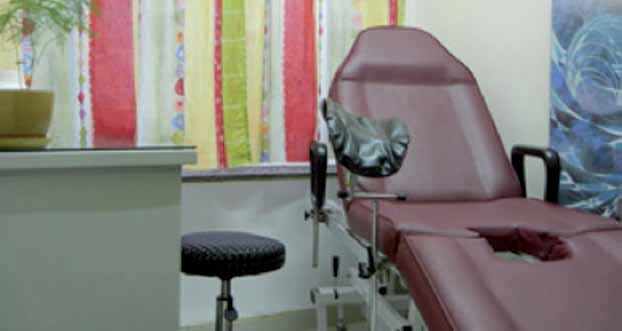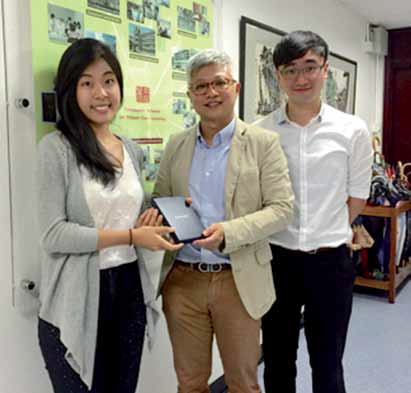© Hong Kong Academy of Medicine. CC BY-NC-ND 4.0
DOCTOR FOR SOCIETY
Looking beyond sexual health: an interview with
Dr William Chi-wai Wong
Alison YY Chan, Rex WH Hui
Year 3, Faculty of Medicine, The University of Hong Kong
Fifteen years ago, as a freshly qualified general
practitioner from the UK, Dr William Chi-wai
Wong bravely embarked on a trip to Yunnan to work
alongside the organisation ‘Save the Children’ to
advocate and inform individuals about sexual health
and HIV prevention. “I was actually quite reluctant
about helping sex workers at the start, as many of us
would be, because our training and understanding
in this area is so limited.” Negative attitudes of the
government, reluctance of brothel owners, and most
important of all, general stigmatisation by society,
provided Dr Wong with an insight into how culture
and societal norms could influence an individual’s
health-seeking behaviour.
After returning to Hong Kong, Dr Wong
approached local non-governmental organisations
(NGOs) such as AFRO (Action for Reach Out) and
Zi Teng (紫藤) in search of opportunities to help
sex workers. Nonetheless, as a university professor
with numerous research interests and publications,
his enthusiasm and passion for sexual health was
initially met with skepticism on the part of NGOs—they were worried that academics like Dr Wong
were just offering help in order to collect data for
their research. Undeterred by this setback, Dr Wong
utilised his expertise as a clinician and offered free
consultations and counselling to sex workers. His
contributions were finally welcomed by NGOs and he
had the chance to further expand his work. Increased
resources and support also allowed the setting up
of outreach clinics, screening tests, and laboratory
services, chiefly run by NGOs but medically facilitated
by willing doctors and nurses. Over the years, Dr
Wong has taken up advisory positions for multiple
NGOs, including working as an executive committee
member for AFRO, on top of his primary roles as Clinical Associate Professor at the University of
Hong Kong and Honorary Consultant at the Ap Lei
Chau General Out-patient Clinic and The University
of Hong Kong-Shenzhen Hospital.
Through his work and research, Dr Wong
realised that much more must be done for these
women aside from just treating and preventing
sexually transmitted infections (STIs). Sex workers
are exposed to multiple health risks such as
alcoholism, illicit drug use, and violence; STIs are
only a small part of the problem. To complicate
matters, some sex workers are illegal immigrants and
not eligible for public health care. For those who are,
irregular working hours and fear of stigmatisation
make it difficult to fully utilise health care resources.
Dr Wong believes that alternative care should be
provided for sex workers and extra steps have to be
taken to help this disadvantaged group. Gradually, Dr
Wong has shifted the focus of his work from sexual
health to holistic care, as is the case in all good family
medicine practice. He has worked on issues such as
mental health, quality of life, social networking, and
human rights, not only advocating these but also
teaching the next generation of doctors by offering
elective placements at some of these NGOs.
Slowly but surely, Dr Wong is starting to see
the fruits of his labour. The topic of sex workers,
albeit still heavily stigmatised, is beginning to be
received differently by the general public. Funding
for outreach clinics is increasingly procurable,
and a more humane approach is being adopted by
law enforcers in the confrontation of suspected
sex workers. The possession of condoms was once
legally accepted as supporting evidence in police
prosecutions. Such guidelines have since been
superseded, but Dr Wong and the NGOs are trying
to advocate for further changes, by requesting that
one be spared any enquiry at all pertaining to the
ownership of condoms, a practice that, if allowed
to persist, is likely to aggravate the health risks
inherently associated with work in the sex industry.
Looking ahead to the future, Dr Wong
envisages an even broader focus for his work. A firm
believer in holistic care, he hopes to help safeguard
the general physical and mental health of these
disadvantaged women, promote human rights for
this subpopulation, and ameliorate the prevailing
societal backdrop and preconceptions about the
sex industry. Dr Wong, more than anyone else,
recognises how traditional culture and established
norms can completely dictate an individual’s health-seeking
behaviour.
On a more personal level, Dr Wong cherishes
the sense of fulfilment he earns from his work.
Interacting with sex workers who yield their bodies to
others every day, he sees immense value in being able
to share their problems and thoughts. “Their minds
are the only thing they still have all to themselves.
Being able to share that, and to help them where I
can, is a very meaningful act.”

Outreach clinic run by ‘Action for Reach Out’, providing free health checks for women engaged in the local sex industry (photo source: http://www.afro.org.hk/EN/clinic.php)


